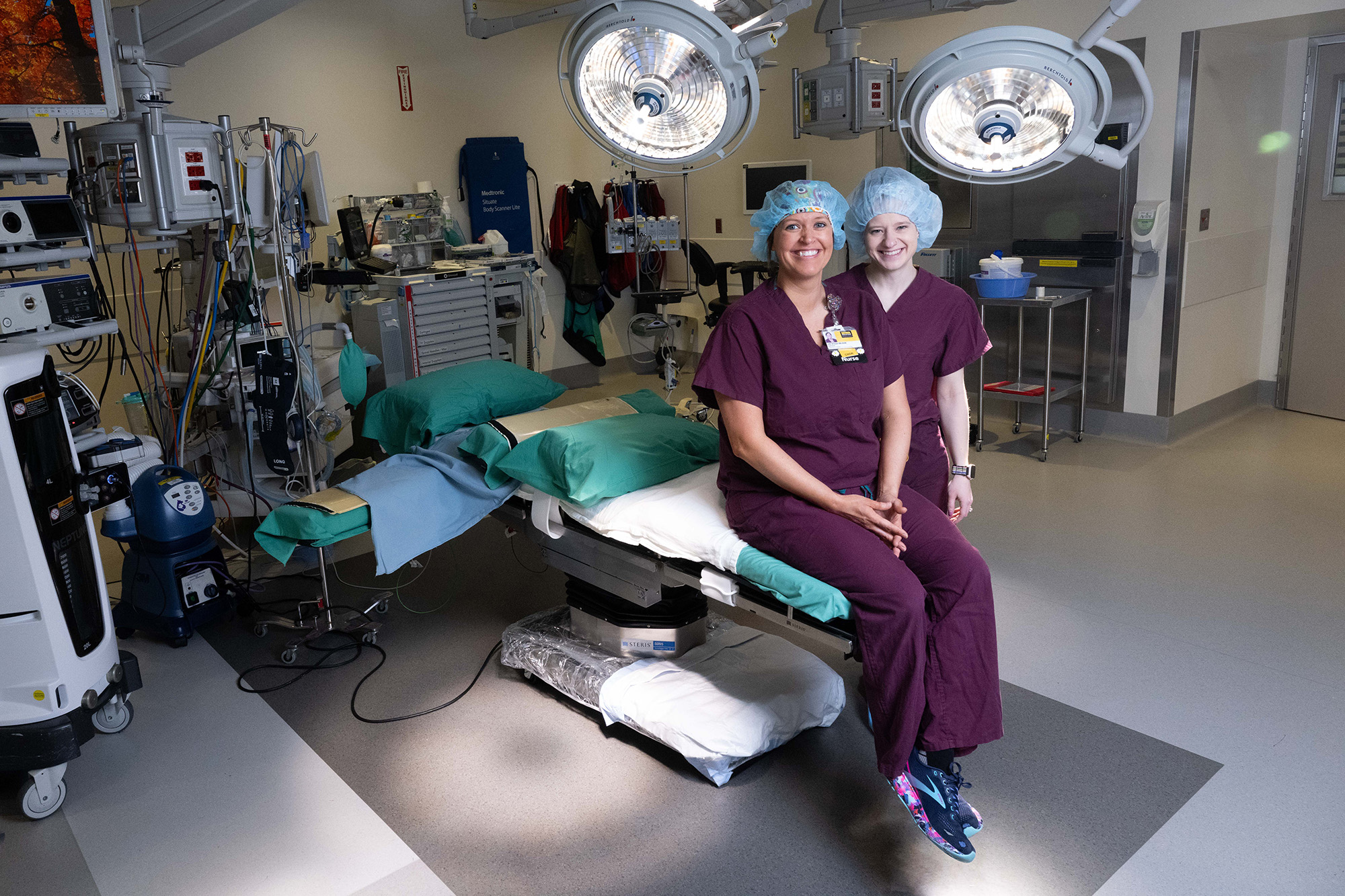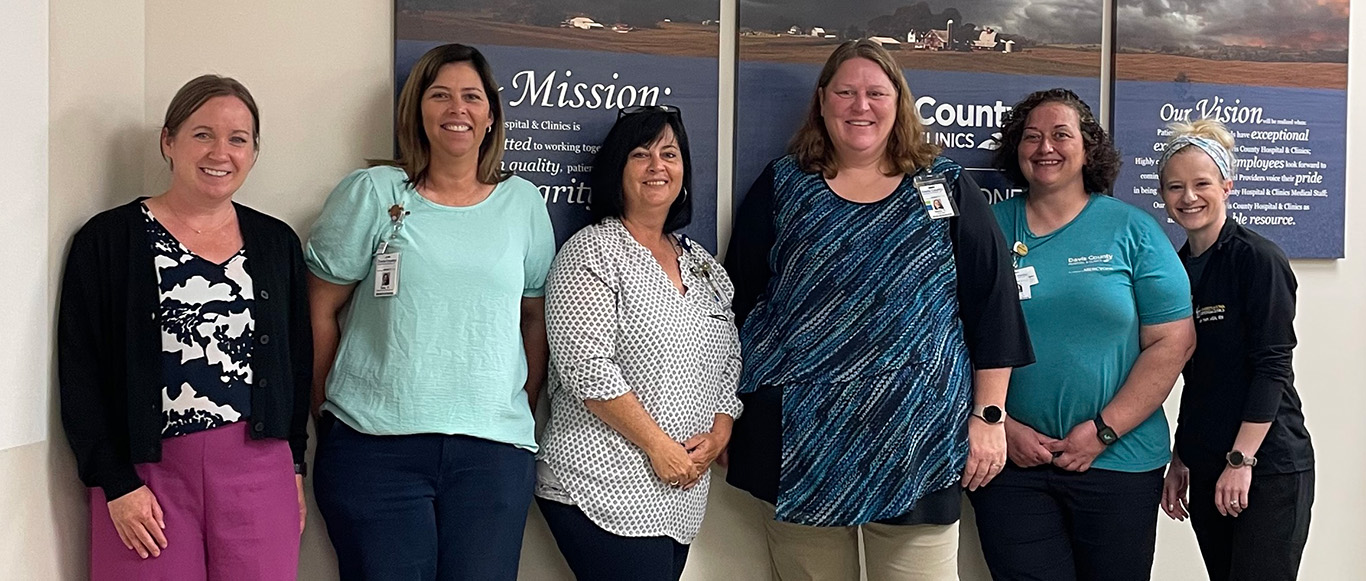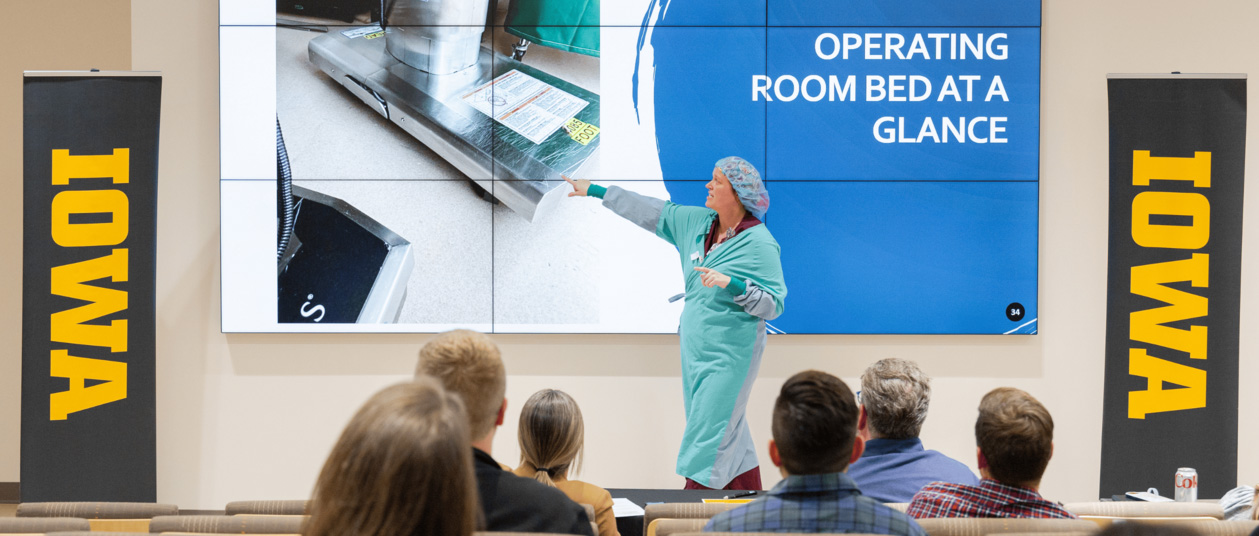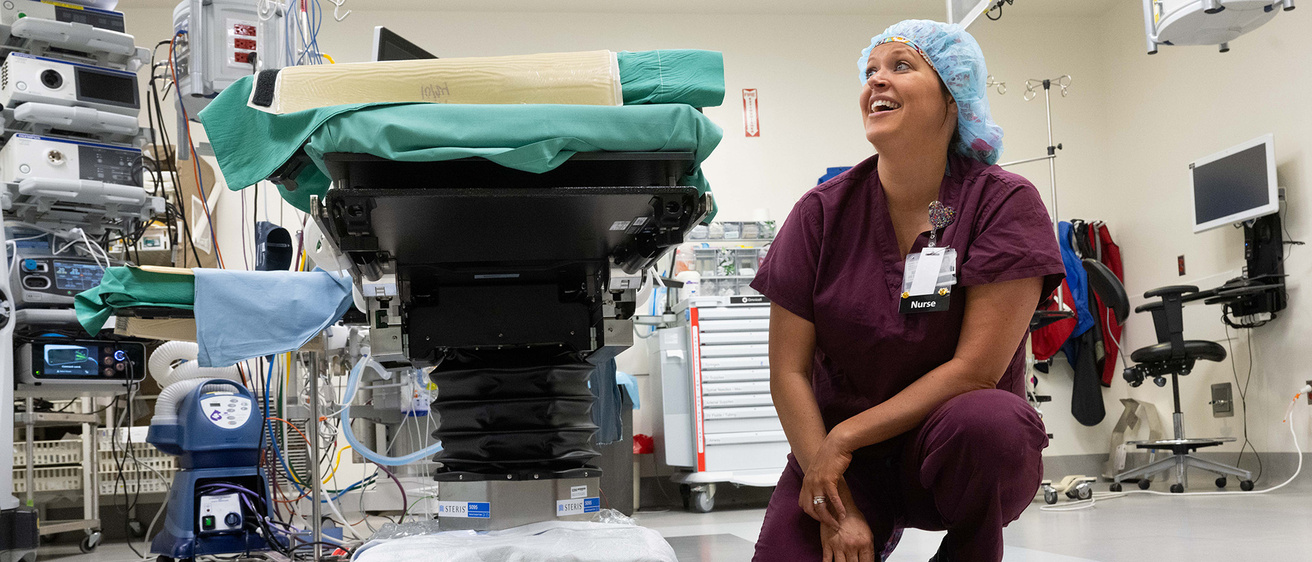Iowa Nurse Innovators, a program within the University of Iowa Office of Innovation, empowers inventive nurses to create solutions improving patient safety, workflow efficiencies, and effectiveness in hospitals across the state.
Story: Emily Nelson
Photography: Tim Schoon and courtesy of the UI Office of Innovation and Davis County Hospital and Clinics
Published: Feb. 21, 2025
The top photo...
Jill Droste, an operating room nurse at University of Iowa Health Care, crouches near the base of a surgical bed whose base is outfitted with a prototype of the Droste Drape, a product that protects the table base from fluids and foreign matter during surgery. Through the Iowa Nurse Innovators program, Droste is testing a prototype of her idea.
Jill Droste used to call it her “gazillion-dollar idea.”
But the operating room nurse at University of Iowa Health Care had no idea how to turn her idea — creating something that would protect the base of a surgical table from fluids and foreign matter during surgery — into an actual product.
Thanks in part to the Iowa Nurse Innovators program at the University of Iowa, Droste is now testing a prototype of her idea — and fielding questions from fellow health care providers about where they can get more.
The Droste Drape fits snugly around the base of the surgical bed and features a pad that can absorb about a liter of fluid. It also reduces trip hazards during surgery and streamlines cleanup afterward.
“These beds have a lot of nooks and crannies,” Droste says. “Everything else in the room is protected, but there was nothing for the base of these beds, which cost tens of thousands of dollars.
“I never expected to do anything like this, but when you think about it, nurses are natural inventors.”

Jill Droste (left) poses with Allison Hurt, Iowa Nurse Innovators liaison and a UI Health Care staff nurse in the medical intensive care unit. “Nurses are constantly solving challenges to meet the patients’ needs,” Hurt says. “The thought behind this program is, ‘If we invest in nurses, will they turn these work-arounds into real solutions that impact patient safety?’ And we discovered that they will.”
Iowa Nurse Innovators, a program within the UI Office of Innovation, got its start five years ago to provide nurses with free guidance and access to resources to turn ideas for new devices or practices into tangible products. After piloting the concept with guidance and support from nurse leadership at UI Health Care, including Emily Ward and Kirsten Hanrahan, a Kauffman Foundation grant allowed the Office of Innovation to pilot the Iowa Nurse Innovators model at UI Health Care and begin to expand across the state.
Jon Darsee, chief innovation officer at Iowa, says he saw firsthand early in his career in medical sales the innovative genius of nurses.
“They taught me everything essential and didn’t hesitate to point out where our products fell short, but also how we could improve the process for patients, nurses, and doctors,” Darsee says. “While doctors play a key role in helping illustrate how the clinical findings we generated enabled better patient treatment strategies, nurses understand the process end-to-end — from the patient to the physician. That perspective allows them to approach solving problems holistically. Those early lessons stuck with me.”
Darsee says he’s always disappointed when manufacturers rely so heavily on physician input but rarely seek out nurses and other allied health professionals until after they have created a product.
“When I arrived at Iowa, we had traditional mechanisms to offer seed funding to surgeons, clinicians, and researchers, but we had never formalized providing nurses with a similar opportunity,” Darsee says. “I was determined to help change that.”
“We want to bring this resource to every nurse in Iowa. Everywhere I go, they are excited and immediately start bouncing ideas off each other.”
From idea to physical product
Getting started is simple. Nurses submit an idea through the Iowa Nurse Innovators website and soon after are contacted by Allison Hurt, Iowa Nurse Innovators liaison and a UI Health Care staff nurse in the medical intensive care unit.
Hurt says she realized right away in her nursing career that she had to be innovative.
“Nurses are constantly solving challenges to meet the patients’ needs,” Hurt says. “The thought behind this program is, ‘If we invest in nurses, will they turn these work-arounds into real solutions that impact patient safety?’ And we discovered that they will.”
After speaking with Hurt about their idea, the nurse is put in touch with MakerHealth, a nonprofit prototyping company that has partnered with the Office of Innovation to help execute aspects of the Iowa Nurse Innovators program. After an exploratory meeting between the nurse, the Iowa team, and MakerHealth, the company sends a kit full of items tailored to turn the nurse’s idea into physical reality.

Anna Young (left), CEO and co-founder of MakerHealth, and Allison Hurt (right) from the University of Iowa Office of Innovation pose with Davis County Hospital and Clinics colleagues Tara Porter, Amy Marlow, Nikki Thordarson, and Teri Hanna. The Davis County colleagues are developing a securement device to enhance safety for both patients and staff when treating individuals who are combative. They won honorable mention, and $2,000, at the Iowa Nurse Innovators pitch competition in 2024.
“It’s a crafter’s dream,” says Teri Hanna, EMS director for Davis County Hospital and Clinics, a Critical Access Hospital in Bloomfield, Iowa. “And as your prototype becomes more defined, they continue to send you more things to play around with.”
Hanna and colleagues Tara Porter, Amy Marlow, and Nikki Thordarson are developing a securement device to enhance safety for both patients and staff when treating individuals who are combative. They say this is especially important in a facility such as Davis County Hospital and Clinics, where staffing is much lower than one in a more populated area — meaning there are fewer people to help defuse such situations.
“We want to find a way to get securement quicker when we have a patient who isn’t in their right mindset and is acting out,” Hanna says. “We want to get in and get out and not have anyone injured in the process.”
Have an idea you want to bring to life?
The Iowa Nurse Innovators program provides nurses with guidance, tools, motivation, support, and access to resources to translate ideas for new devices or practices into tangible products.
The team from Davis County Hospital and Clinics is one of the first groups from outside UI Health Care to participate in the Nurse Innovators program. Since the Davis County team began working on their product in 2024, Hurt has engaged nurses in Iowa communities including Spencer, Mason City, Webster City, Storm Lake, Cherokee, and Davenport.
Iowa has 83 Critical Access Hospitals, each with 25 or fewer beds. And like Davis County Hospital and Clinics, each has its own set of unique challenges. Hurt has been busy traveling to facilities across the state to make sure their nurses know about the Nurse Innovators program.
“We want to bring this resource to every nurse in Iowa,” Hurt says. “Everywhere I go, they are excited and immediately start bouncing ideas off each other.”
Making innovation affordable for nurses
Inventing a product is not a cheap endeavor. Hurt says a nurse working independently would likely spend thousands of dollars before they even ended up with a prototype.
“We really are a very unique program in that we’ll get you all the way to a prototype and then help you start pitching in for funding to take it further,” Hurt says.
The Iowa Nurse Innovators program is currently funded by a grant from the Kauffman Foundation in Kansas City, Missouri, matched by the Office of Innovation. In September 2024, the Iowa Board of Regents gave the University of Iowa Office of Innovation permission to request $1 million from the Iowa Legislature to help expand the program to reach as many nurses across the state as possible.
A nurse graduates from the Nurse Innovators program once they have a prototype in hand. But support doesn’t end there. Nurses can get patent and licensing support through the University of Iowa Research Foundation, along with access to a variety of resources through the Office of Innovation. Nurses can pitch UI Ventures for funding, then turn to Protostudios to develop a manufacturable prototype. The Iowa MADE program can facilitate manufacturing and sell products via established relationships to Iowa manufacturers and in-house e-commerce platforms.
“If a nurse would like to solve a challenge on their unit and that’s as far as they would like to take it, that’s great,” Hurt says. “But if they have the desire to take it all the way to market, we have the resources within the Office of Innovation to help them do that.”
Empowering new nurses to innovate
Allison Hurt, Iowa Nurse Innovators liaison employed by the UI Office of Innovation and a UI Health Care MICU staff nurse, says you don’t have to be a seasoned nurse to come up with solutions to the challenges nurses face.
She wants to instill the power to innovate into nurses right at the beginning of their careers. To help with this, she is working with the Nurse Residency Program to allow their nurses to fulfill a program requirement by working on an Iowa Nurse Innovators project.
“We want nurses to come into their career thinking, ‘If I see a problem, I have a pathway to make a change instead of just dealing with it or coming up with a work-around,’” Hurt says. “If they know about us from the get-go, then they know they have somewhere to turn when they do come up against a challenge and have a potential solution.”
To help with costs of developing a product, the Iowa Nurse Innovators program hosts an annual pitch competition for its participants. In November 2024, the program awarded $54,000 to participating nurses.
Droste pitched her Droste Drape in the 2024 competition and tied for first place, winning $20,000. She has submitted a patent disclosure to the University of Iowa Research Foundation and is seeking a manufacturer to build the product. Droste is currently testing her prototype in operating rooms at UI Health Care and seeking feedback. She’s heard no complaints; in fact, she doesn’t have enough prototypes to fill the demand for them.
“I’ve had surgeons and nurses request them,” Droste says. “We’ve had traveling nurses come in and ask, ‘Where do you get these?’ People are excited and are pumped that such a tedious task, like effectively cleaning a bed, has become an easier one. It helps nurse morale and cuts down on the time it takes to turn over the room for the next patient.”
The team at Davis County Hospital and Clinics won honorable mention, and $2,000, for their pitch in 2024. However, they are still in the early phases of building their prototype and haven’t decided what may be next for it. But, they say, they are grateful for the support the Nurse Innovators program has given them to address a serious challenge in their hospital — and they are already thinking about potential next projects.

Jill Droste pitched her Droste Drape in the 2024 competition and tied for first place, winning $20,000. She has submitted a patent disclosure to the University of Iowa Research Foundation and is seeking a manufacturer to build the product.
Improving job satisfaction and retention
Along with enhancing patient outcomes and improving efficiency in the workplace, the Nurse Innovators program also aims to impact job satisfaction and retention among the state’s nursing population.
“Nurses are a critical piece of the social fabric of our rural communities, and rural communities can only flourish with access to quality health care,” Darsee says. “Replacing a nurse in these rural communities is often difficult, time intensive, and expensive. A nursing shortage is a major problem facing the United States. The Nurse Innovators program has the potential to slow nurse migration from rural communities, improve job satisfaction, and impact patient safety.”
Droste says nurses are natural inventors. And watching her fellow nurses pitch their ideas in the 2024 Iowa Nurse Innovators pitch competition, she says she was inspired.
“I know and have seen their frustrations firsthand,” Droste says. “We just needed that platform to be able to pitch our idea and bring it to life.”
Nursing careers at UI Health Care
University of Iowa Health Care is looking for dedicated nurses in all fields. The need is especially great for perioperative (OR), neuroscience, pediatric, and medical/surgical nurses.
Open positions can be found on the Jobs@UIowa website, where you can sign up for regular alerts of new jobs as they’re posted.
Hurt says nurses have profound contributions to make to health care and should be empowered to turn ideas or current work-arounds into impactful solutions — just as their colleagues who are physicians and researchers are.
“We are such an inventive profession, and the university now has the expertise and resources to help our people bring their ideas to life,” Hurt says. “Input and inventions from nurses can lead to more efficient devices, methods and support tools — ultimately improving patient safety.”
